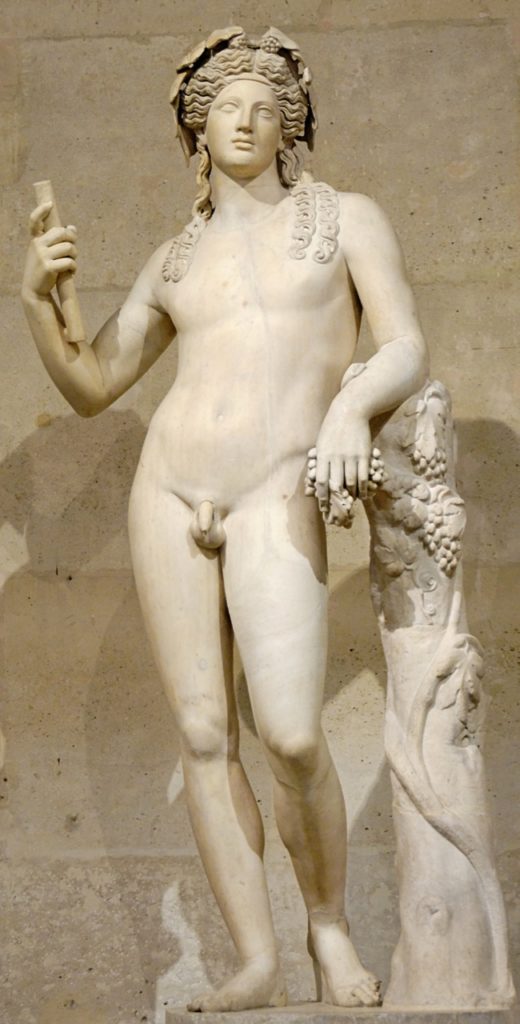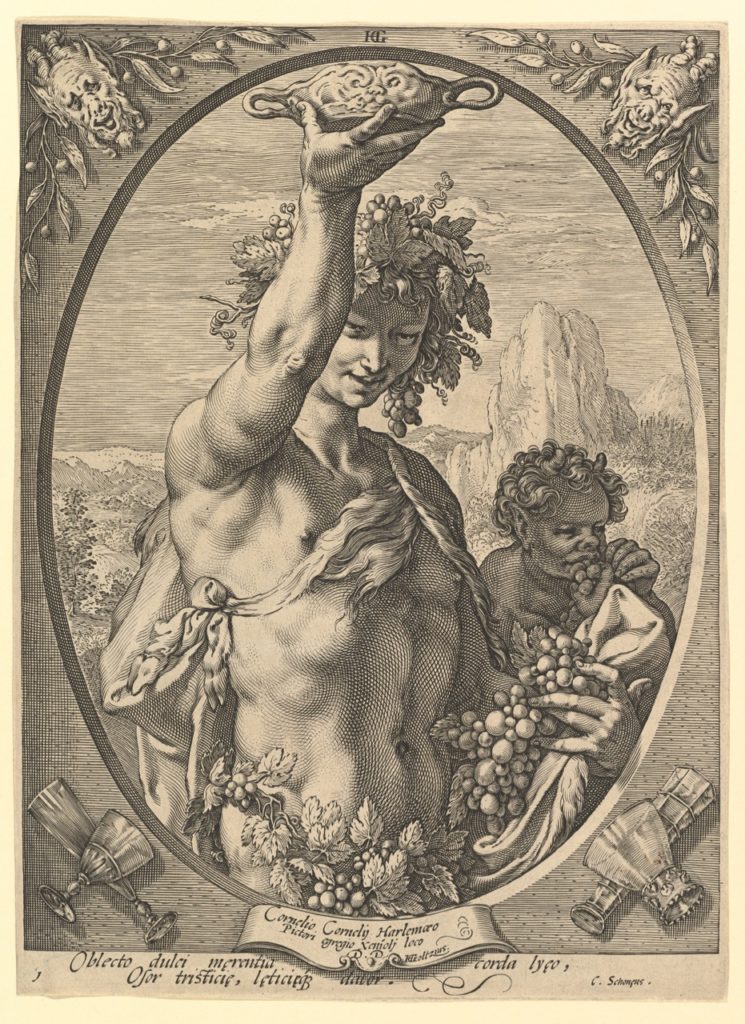Once upon a time, King Pentheus of the Greek city of Thebes worked himself into a froth, because a new god named Dionysus had called the city’s women into the hills for drinking, dancing, and love-making. Pentheus could not abide this, especially the female revelers.

“When women get to celebrate with gleaming wine,” he fumed, “there’s a ritual that’s gone rotten.” He jailed all the truant wives he could find, swore to hunt down the others, to “capture them in iron traps,” then to sell them or enslave them himself. But first he felt oddly compelled to find a stranger who had arrived in town, a man with flowing, perfumed, golden curls and “rosy, wine-flushed cheeks.”
The thought of this effeminate stranger filled Pentheus with rage. He had to find him, would find him, did find him. He handcuffed and interrogated the stranger, then, shaken by the stranger’s uncanny replies and otherworldly gaze, threw him in the palace jail. But the stranger was Dionysus in disguise. And Dionysus is the life force personified, along with all his women — his maenad companions. Pentheus, in his fury, forcibly suppressed the life force. He tried to contain, control, and silence that elemental power.
This story is 2400 years old, written by Euripides in a play called The Bacchae, but Pentheus still stalks among us. He goes by different names these days, but lately his face has been all over the news:
- On June 2, Judge Aaron Persky and a rapist named Brock Turner colluded in a Penthean attempt to silence a woman known as Emily Doe who had indulged in Dionysian drink and dancing. A jury convicted Turner on three felony accounts for assaulting Emily while she was unconscious — he seized control over her helpless body — but the judge sentenced Turner to only six months in jail.
- On June 10, Kevin James Loibl equipped himself with two handguns, a hunting knife, and two extra magazines of ammunition to kill the unarmed, twenty-two year-old singer Christina Grimmie. Grimmie’s voice sounded like Burgundy wine before Loibl silenced her.
- On June 12, Omar Mateen, armed with an assault rifle and a handgun, slaughtered 49 people at the LGBTQ nightclub Pulse, which is basically a temple to Dionysus. Mateen stilled those dancing bodies.
- On June 16, Thomas Mair shot and stabbed to death Jo Cox, a 41-year-old, unarmed British MP who had stepped out into the world, into the halls of Parliament, where she wore a bright red maenad dress and raised her voice in support of refugees and of Britain remaining in the EU.
![Pentheus Being Torn by Maenads, By WolfgangRieger [Public domain], via Wikimedia Commons](https://joannagardner.com/wp-content/uploads/2016/06/Pompeii_-_Casa_dei_Vettii_-_Pentheus-1-994x1024.jpg)
The life force will not stand for this. The life force demands to live. It demands connection, expression, release. Back in Thebes, Dionysus wasn’t in prison for five minutes before an earthquake shook the palace down and lightning struck, burning all the timbers. Dionysus strode out untouched, stepping easily over the rubble and through the smoke, summoning the women back to his side.
The spirit of Dionysus also broke out of jail when Emily Doe released her victim statement from the trial. Her life force burst free in her evocative words, and America roared in outrage. Dionysus escaped when tributes to Christina Grimmie flooded the internet, and her voice reached millions who might not otherwise have heard her. Dionysus roared after the tragedy at Pulse, when Democrats in the Senate lifted their voices in a 14-hour filibuster and then those in House staged an overnight sit-in, demanding sanity in gun regulations.
Dionysus shook the UK after Jo Cox’s murder, too. But Pentheus marched back, goose-stepping across Britain and bellowing lies about independence and refugees. Really he wanted independence from refugees, freedom from having to help people in need. Pentheus scorns interdependence. He got his way, for now. Britain voted for rigid borders, for going it alone, for severing a life-giving connection.
In the story, Pentheus thinks that the life force he wants to kill is outside himself, outside his whole city. In reality, Dionysus is within the city walls, within the palace, within Pentheus himself, even though Pentheus savagely represses his own capacity for connection and expression. He is terrified of and disconnected from his own life force. His aggression is his self-hatred. And sure enough, his violence boomerangs right back home.

After Dionysus left the jail, he lured the king to the forest to spy on the women’s revels. The women ripped Pentheus limb from limb, then they tore his limbs to shreds. He got his wish for disconnection. The maenads disconnected him, part by part by part.
It’s a chilling end to a chilling tale, like the headline news this month. Pentheus is what happens when anyone acts out their fear, fury, frustration. Dionysus, on the other hand, stands ready to assist with the creative expression of those big feelings, or to help come up with innovative ideas for changing the situation. Emily, Christina, everyone at Pulse, and Jo all demonstrate how to express and address feelings, rather than act them out.
Dionysus is the life force personified. The life force creates. Pentheus is fear. Fear blocks, stops, controls, contains. As surely as Dionysus lives within us all, so does the tyrant king. May the maenads do their grisly work every time he rises.